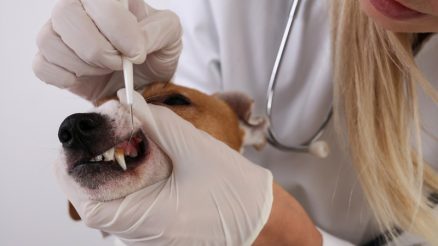Pets enrich our lives with their affection and companionship but cannot vocally communicate their discomfort or pain. Therefore, recognizing the subtle signs that your pet may be unwell is critical for pet owners.
Understanding Pet Behavior and Physical Changes
Being vigilant observers is crucial in identifying health issues in our pets. The initial mark of a potential problem often lies in recognizing deviations from their normal patterns, whether it’s a sudden reluctance to play, changes in eating habits, or differences in social interaction.
Physical alterations, such as variations in weight, coat condition, or unusual signs in bodily functions, also serve as critical indicators. Monitoring these nuances promptly can lead to early detection and more effective management of your pet’s health.
Behavioral Indicators of Illness
Decreased Energy: If your usually perky fur friend is less interested in playtime, it could be an indicator of sickness.
-
Lack of appetite: Refusing meals or treats can signify health issues.
-
Increased aggression: Uncharacteristic snapping or hissing may mean it’s time for a checkup.
-
Unusual vocalization: Listen for changes in their meows, barks, or chirps that indicate distress.
Physical Symptoms to Look Out For
Grooming Habits: A well-groomed pet is generally a healthy one. Conversely, a sick pet may neglect to groom or groom excessively in one spot.
-
Weight fluctuations: Sudden weight loss or gain is a red flag.
-
Changes in eyes or nose: Discharge or drastic changes should be explored.
-
Alterations in stool: Consistency, color, or frequency in bathroom habits can point to problems.
Common Illnesses and Their Symptoms
It’s essential to know which symptoms might point to certain common illnesses. Respiratory Infections: Watch for coughing, sneezing, labored breathing, or nasal discharge. Digestive Upsets: Look for vomiting, diarrhea, or constipation as possible indicators. Skin Conditions: Rashes, bumps, or significant hair loss can all signal underlying issues. Urinary Disorders: Difficulty urinating or blood in urine are symptoms that should never be ignored.
When is the time for a vet visit?
Short paragraph: Not every sneeze or hiccup requires a vet visit, but certain signs are sure indicators. Being alert to these can prevent more serious complications.
-
Persistent symptoms: Ongoing or worsening symptoms necessitate professional input.
-
Behavioral changes: If your pet is acting out of character for over 24 hours, it could be a sign of illness.
-
Emergency signs: Severe symptoms like seizures or collapse mean a visit to the vet cannot wait.
Importance of Visiting the Vet
Pets require routine medical care just as humans do, and neglecting this can lead to more serious issues. Whether it’s for a routine checkup for pets, vaccination updates, or a sudden illness, visiting a professional like a veterinary surgeon in McAllen can make all the difference in your pet’s health and longevity. These experts can provide an accurate diagnosis and the appropriate treatment, saving you not only time but potentially your pet’s life.
Navigating the Range of Pet Services Available
As pet owners, we are fortunate to have access to a variety of pet services that cater to our furry friends’ needs. From pet grooming services to advanced medical care, there’s a lot that goes into keeping our companions healthy. When your pet requires more specialized care, an internal medicine vet can offer services such as endocrinology, gastroenterology, and oncology, which can be critical in treating chronic or complicated health conditions.
Finding the Right Animal Hospital and Care
Selecting the right type of care and facility is crucial for your pet’s health. When looking for an animal hospital in McAllen, TX, consider what services you may need. You might look for a facility that offers pet dental care or one that has an emergency vet clinic on-site. Regardless of the specific needs, finding a reliable and compassionate animal care center is a non-negotiable for responsible pet owners.
Preventive Care and Routine Maintenance
Pet ownership is a proactive endeavor. Regular preventive care can head off issues before they become serious. Vaccinations are a cornerstone of pet health, effectively preventing various diseases. Routine health checks, including bird vet checkups or reptile vet services, also ensure that pets remain at the pinnacle of health.
-
Pet dental care: Regular dental checkups prevent periodontal diseases.
-
Nutritional counseling: Ensure your pet’s diet supports their overall health and well-being.
Being Prepared for Pet Emergencies
Embracing the unpredictable nature of pet health means being prepared for emergencies.
-
Emergency Services: Know the location of your nearest emergency vet clinic and have a plan in place.
-
Transport Safety: Keep your pet comfortable and safe during the journey to care.
Special Considerations for Different Pet Types
Pets come in all shapes and sizes, and their health considerations do, too.
-
Canine and Feline Health: Dogs and cats are prone to specific ailments that require particular attention.
-
Exotic Pet Services: Unique pets such as birds and reptiles may need specialized veterinary care.
To End
Recognizing the signs that indicate when your pet is sick is a loving and vital aspect of pet care. It is the foundation on which the long-term health and happiness of your pet rests. Regular vet visits, an understanding of the extensive range of services, and the knowledge of when to seek them are all part of the tapestry of responsible pet ownership.
Please always be careful with any changes in your pet’s behavior and physical condition, and when in doubt, seek the expertise of a trusted veterinarian. Your furry, feathered, or scaled companion relies on you to be their advocate, and ensuring their health is a testament to the bond shared between pet and owner.





